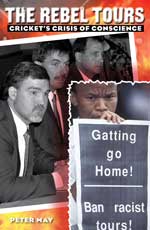 The Rebel Tours began with a desire to read a book, not to write one.
The Rebel Tours began with a desire to read a book, not to write one.
Neither I nor my brother have knowingly allowed a birthday or Christmas to pass without adding to a formidable collection of cricket paraphernalia: board games, videos, gloves, wickets, bats, balls, and books.
Books about professionals and books about amateurs. Biographies and autobiographies. Compendiums of Wisden and collections of ‘wit and wisdom’. Books that were entertaining, insightful and important, and others that were less so.
Yet when the subject of the rebel tours came up in conversation three years ago, neither of us had even the basic information. Graham Gooch had gone over early on, my brother thought. And I knew that Mike Gatting led a tour at the exact moment FW De Klerk was releasing Nelson Mandela from prison, unbanning the fiercely anti-tour ANC and allowing black protest. That had to be an awkward moment.
They had been controversial and difficult and were occasionally still brought up in Private Eye if Gooch, Gatting or Geoffrey Boycott criticised others for disloyalty. But the details were almost entirely obscure to those of us who are old enough to remember but were too young to understand.
Never mind, we thought. There would be a book or two on the tours. We’d pick them up second hand, have a read and have a chat. And yet……(and you may be ahead of me here)……. there wasn’t a book on the rebel tours.
Where cricket’s other great crises, Bodyline and Packer, have received extensive analysis the rebel tours have scarcely been examined. In particular the cricket itself, despite featuring some colossal figures, has received virtually no attention at all.
Having researched and written The Rebel Tours, my incomprehension has only grown. They are a unique sporting phenomenon. Even without the sport itself, just a handful of the ingredients are fascism, locusts, a boycott, G Boycott, greed, secret codes, covert international travel, media hysteria, political corruption, death threats and the fall of apartheid. The ferocity of the controversy beggars belief looking back now.
So what exactly has put people off?
The most obvious explanation is regret. The cricket itself is a source of curiosity rather than admiration. Many politicians, administrators and writers – particularly in the UK – have good reason to stare at their hands if their children ever ask, ‘What did you do to oppose apartheid, Daddy?’ Ali Bacher himself has admitted he didn’t understand the full South African context until 1990. Two decades on it is rare to hear a defence of the tours from anyone but a former tourist.
But the fact that not everyone emerges from the story with a medal on their breast and a song in their heart is hardly reason not to tell it. Many protagonists were wary of involvement in the book, no doubt fearing a scandal-ridden polemic handed down from a moral high horse. However I’ve resisted the urge to show everybody in the worst possible light without shying away from the often awkward and sometimes awful truth of the tours.
If nothing else you will hopefully be astounded reading The Rebel Tours that no-one has done this before. I know I still am.
